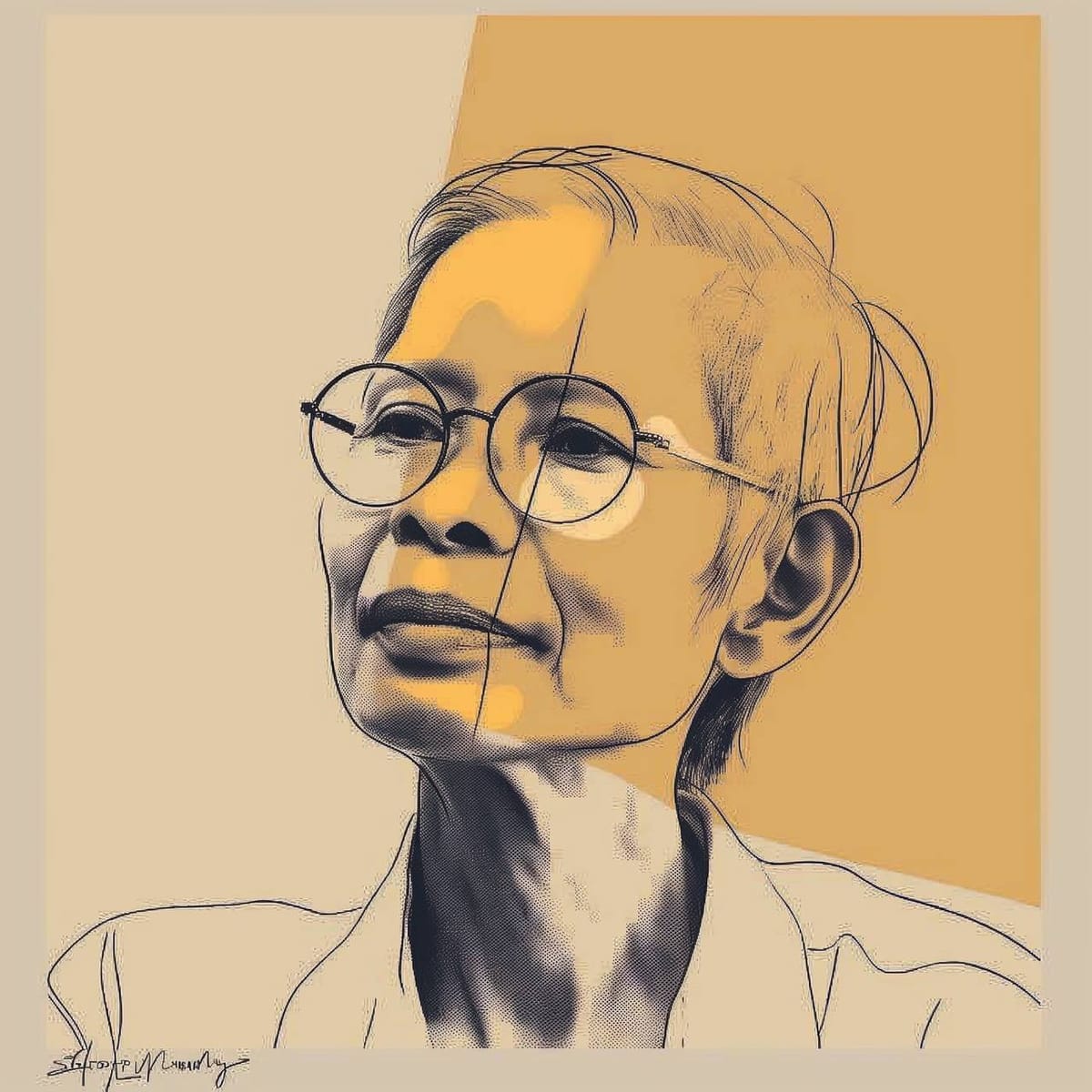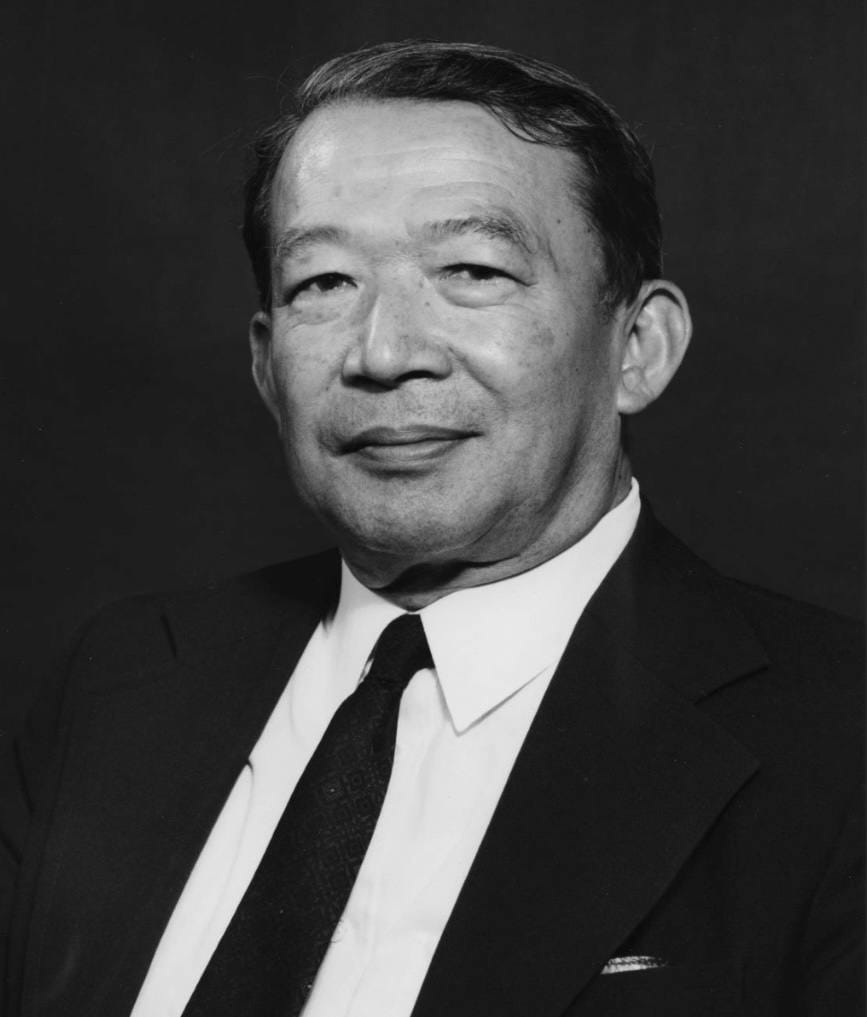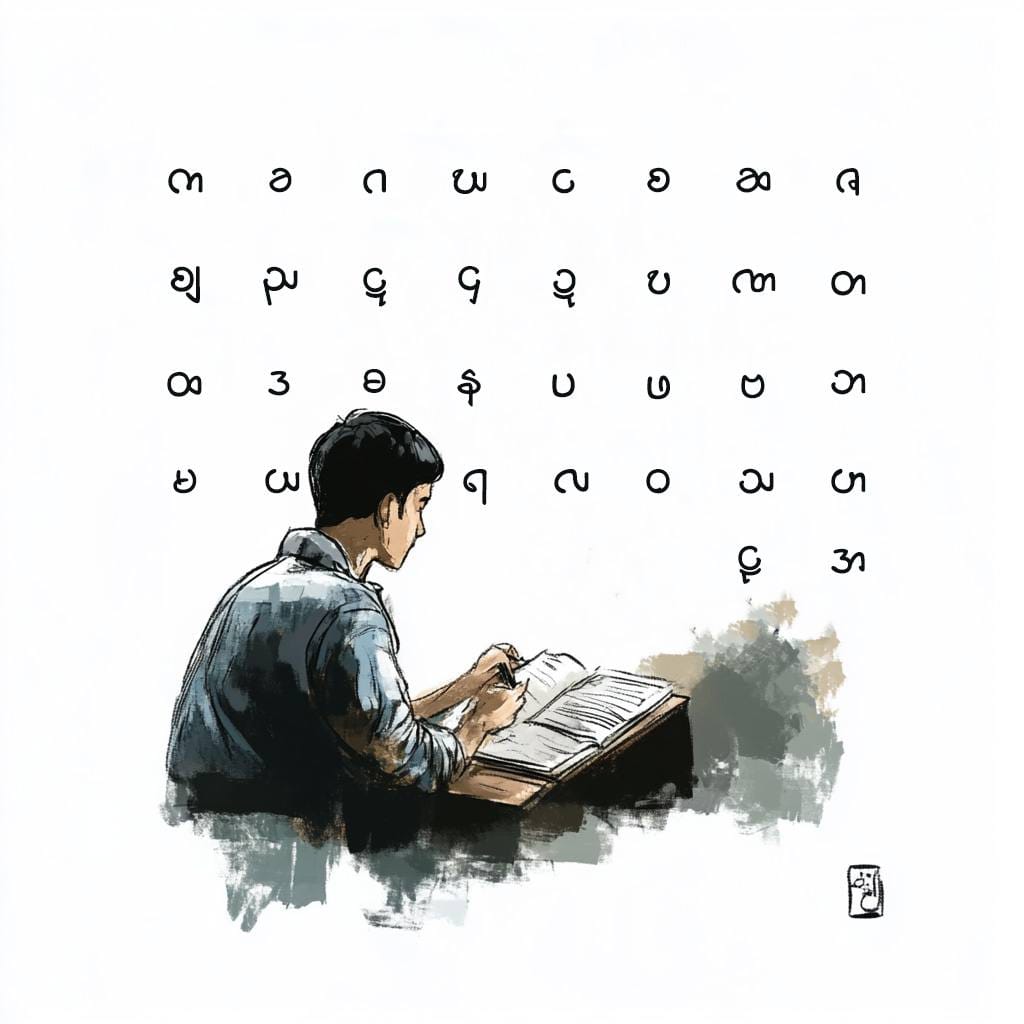
"As long as you don't have the determination to progress in life, as long as you don't have a strong desire to improve, you will never progress. This is an absolute truth."
This quote is from the book "Legacy" by author U Aung Thin, written about young people.
There are many Myanmar writers who care about and support the new generation of Myanmar youth. However, U Aung Thin is widely accepted as someone who has an enormous passion for young people and wants them to succeed.
Before we continue this article, please allow me to refer to U Aung Thin as "Teacher," as young people affectionately call him.
Throughout his writing career, the majority of the Teacher's books were aimed at young people. His writings for youth focused on critical thinking, morality, progress and prosperity, resilience in the face of worldly conditions, seizing opportunities, persistent effort, and benefiting oneself and one's surroundings. These were writings that emphasized both mental and physical development.
However, these writings were based on practical experience and were not like today's motivational books that give false hope.
The Teacher's book "For the New Generation to Progress" even became like a helpful manual for young people.
"Let me tell you something to think about. I'm not wrong to encourage you to study hard in your youth. Knowledge can only be acquired with great effort and time when you're young and energetic. Well, let's put that aside. What I want to tell you is that if you still have youth, if you still have time, study hard, read books and learn. Don't listen to the words of 'adult fools.' If they come and say such things, ask them back, 'So what should I do?'"
Using "you and I" when speaking to young people is the Teacher's unique style. He uses this in both his public speeches and writings. His passionate approach, speaking concisely and clearly without beating around the bush, getting to the point, and talking intimately like an uncle or elder brother are the things that strengthen the bond between young people and the Teacher.
The Teacher's life journey was also exemplary for young people. U Aung Thin, born in Taungdwingyi, Magway Division, was born on April 17, 1927, to Thakin Nyi Maung and Daw Shwe Kyin. He was the eldest of three children.
When talking about the Teacher, we can't leave out his father, Thakin Nyi Maung. Thakin Nyi Maung was not only the chairman of the Taungdwingyi branch of the Dobama Asiayone but also the founder of the Taungdwingyi Dobama Asiayone. The Teacher's mother passed away when he was in sixth grade, so his father's influence was dominant. His father also planted the seeds of love for literature in him. The Teacher admitted in his essay about his father that his basic mindset of living honestly, having patriotism, and persistently doing what he believed in was inherited from his father.
U Aung Thin studied only in national schools due to his father's decision not to accept colonial education. In his youth, he wasn't very interested in education and failed the seventh-grade exam. He then dropped out of school.
After World War II, he joined the People's Volunteer Organization. Later, he joined the Socialist Party and became a district organizer. At that time, he only knew basic English words like "He" and "She," and he envied university students and had a strong desire to learn English. However, around 1949, when the multi-colored rebellion was at its peak, he was arrested by the White Band and imprisoned. He lived in Taungdwingyi Prison, Magwe Prison, Pyay Prison, and Tharrawaddy Prison, and in November 1949, he escaped from Tharrawaddy Prison.
His article about this experience, "When I Broke Out of Tharrawaddy Prison," was published in the May 1959 issue of Myawaddy Magazine. This was also the Teacher's first published work.
The Teacher learned English, which he really wanted to study, while in prison. This also demonstrates to young people how to make the best use of difficult situations. Moreover, it wasn't just talk; he actually did it in practice.
The person who taught English to the Teacher was Thakin Kyaw Sein, whom the Teacher referred to as his "prison mate." Due to prison transfers, he was only able to study properly for about four months out of his seven-month prison term. However, due to the Teacher's diligent study, he progressed to the point where he could easily read the tenth-grade English textbook.
If he hadn't been arrested by the White Band, he might not have reached this level. He even wrote in his book "Don't Be Afraid of the Future" that going to prison was "a blessing in disguise." In his public speeches, although people referred to him as "Aung Thin from Taungdwingyi," he introduced himself as "Aung Thin from prison" because he had been in so many prisons. The Teacher was also someone who could endure the hardships of his prison life with humor.
To continue the story, the Teacher returned to Taungdwingyi after being released from prison. He retook the matriculation exam. After passing the exam, he became a middle school teacher in 1953. In 1958, he continued his studies at Yangon University and graduated in 1960. In 1961, he pursued a B.Ed and became a university lecturer in 1962. In 1963, he contributed three papers to the Kantharyar Journal, which included nationally renowned writers like Zawgyi, Min Thu Wun, Tekkatho Tint, and Min Yu Wei. Two of these papers were prescribed as school texts in upper and middle school Myanmar prose selections.
The Teacher, who had great passion for young people, really enjoyed his university teacher life. It's said that his room in Taung Ngu Hall was always bustling with students. Every class he taught was full of students. He would listen respectfully to his students' questions and give satisfactory answers. Even if he didn't know the answer, he would admit it and explain reasonably.
In the 1970s, students at Yangon University collectively made wall magazines. The Teacher, wanting these wall magazines to be successful, personally directed their creation. He even drew the illustrations needed for the wall magazines himself. This passionate act later became like a crime for the Teacher.
Here's what happened. When making the wall magazines, a student asked for help because he couldn't draw a frog. The Teacher drew a small frog, and a small ink drop fell beside it. The Teacher told him to erase it, but due to lack of time, it wasn't erased and the frog with the small black ink stain remained in the wall magazine. This small black ink stain on the frog image became an accusation, interpreted as symbolizing that Myanmar was in darkness.
In addition, in one of the poems in the wall magazine, if you read only the first capital letters, it spelled out "7 July" (Seven July - 7 July). This was also accused of being a crime. Seven July refers to the student movement protest against the 1962 coup.
For these issues, the Teacher was interrogated by a special investigation team that included the Deputy Minister of Education himself. As a result, in April 1978, the Teacher was fired for alleged involvement in political activities.
The Teacher was so emotionally affected by losing his university teaching job, which he valued and loved so much, that he cried. After he lost his job, his students didn't dare to visit him, and his colleagues avoided him. However, the Teacher's love for his students and young people didn't fade. These events were written about by the Teacher's son, who is also a writer, Aung Myint Thin, in a series of articles titled "U Aung Thin, Beloved by Youth."
After retiring as a school teacher, the Teacher persistently taught private tuitions and wrote. When writing, the Teacher's literary criticisms made quite an impact in the literary world. Because of the Teacher's powerful pen, he was called the Guardian Spirit of Literature, and U Win Nyein, the helmsman of Shwe Amyutay, honored him with the title "Literary Rough Prince."
Being a former school teacher and having great passion for young people, the Teacher later prioritized writing for young people. He also spoke at literary talks.
"For the New Generation to Progress," "Moral Pride," "Legacy," "Don't Be Afraid of the Future," and "Ethics and Knowledge" are some of the Teacher's books that influenced the youth.
"I'm not a person qualified enough to have the right to speak about young people. I'm going to talk about the experiences and thoughts from the different life experiences I've encountered. Therefore, please don't expect too much from me," he often said at literary talks.
Although he humbly said he wasn't qualified enough to speak about young people, the Teacher's writings on youth issues had a great influence on young people. His literary talk companions say that in almost every town they visited, there were young people who came to pay respects, saying, "My life has progressed, has changed because of your writings."
"I'd like to present a phrase we Burmese often use. It's 'making others' problems your own.' As you know, it's used with a negative connotation. It's said as a criticism, isn't it? But as far as I've learned and observed, I think those who are called great kings and queens are those who made others' problems their own. I'm just saying this for you to think about."
U Aung Thin, loved by young people and who loved young people, passed away on October 25, 2014, at the age of 88 from old age disease. He left behind more than 40 books for young people and literary audiences.
"Poets, literature lovers, and love fools - I love all three of them the most. Because they have hearts. Money fools and power fools - I hate both of them the most. Because such people don't have hearts." These words of the Teacher remain as words of love encompassing young people even though the Teacher is no longer with us.
Nyi Thit Moe (Y3A)
Read More:
 Build Myanmar - MediaBuild Myanmar Staff
Build Myanmar - MediaBuild Myanmar Staff
 Build Myanmar - MediaY3A
Build Myanmar - MediaY3A
Build Myanmar-Media : Insights | Empowering Myanmar Youth, Culture, and Innovation
Build Myanmar-Media Insights brings you in-depth articles that cover the intersection of Myanmar’s rich culture, youth empowerment, and the latest developments in technology and business.
Sign up for Build Myanmar - Media
Myanmar's leading Media Brand focusing on rebuilding Myanmar. We cover emerging tech, youth development and market insights.
No spam. Unsubscribe anytime.
Sign up now to get the latest insights directly to your mailbox from the Myanmar's No.1 Tech and Business media source.
📅 New content every week, featuring stories that connect Myanmar’s heritage with its future.
📰 Explore more:
- Website: https://www.buildmyanmarmedia.com/
- Facebook: https://www.facebook.com/buildmyanmar
- YouTube: https://youtube.com/@buildmyanmarmedia
- Telegram: https://t.me/+6_0G6CLwrwMwZTIx
- Inquiry: info@buildmyanmar.org
#BuildMyanmarNews #MyanmarUpdates #MyanmarNews #BuildMyanmarMedia #MyanmarNews #myanmarliterature #myanmararticle #BusinessNewsMyanmar #Insights #Media
